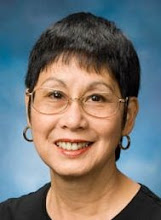Tom and I were driving home from lunch one day when we found ourselves stopped in a left turn lane and unable to get out of the way, while a police car with sirens blaring veered around a slow car in its path and came speeding down the middle of the street, head-on toward our car. In the seconds before the police car zoomed by us, missing us so closely that we felt the car shake as he whizzed by, I knew that my life could have changed drastically, or even been ended, in a split second. Fortunately, it was not our time.
Some of us plan and set goals. Others believe life will always be like it is now and don’t worry about it. But none of us really knows what is around the corner. The trouble with predicting the future is that we can only assess the information available to us today. We don’t know what is going to happen tomorrow that can throw the whole thing onto a different trajectory. A diagnosis, a pink slip, an accident, an introduction, a random event, a natural disaster, any one of these things can throw all our plans and predictions out the window .
This sometimes worries me more than it should. It’s a cloud that hangs over happy moments, the thought that good things can go bad in the blink of an eye. Yet, the future can also turn out better than we ever hoped, as it sometimes has for me. The unpredictability works both ways.
When I was in junior high school, I predicted that I would never get married. At no time did I ever dream that I would be a widow at age 46. And at age 46, I really didn’t think I’d ever marry again. But life proved me wrong.
I had a best girlfriend all through elementary and high school, and I thought we would be friends for life. She died when we were both 29. When I was in my 30’s, I loved having a job so much that I predicted I would never retire as long as I was healthy enough to keep working. Flash forward, I retired at age 56, in very good health.
A common interview question is to ask “Where do you see yourself in five years?” A far scarier question to me is where I might see myself in twenty years. Perhaps my volunteer work of talking to elderly people who are in depressing, even desperate, circumstances: alone, impoverished, ill, or mentally unstable, skews my vision of what the future could hold. These are, I keep reminding myself, worst case scenarios, and most people don’t spend their later years in this way.
We make choices, large or small, every day, and these choices can influence the futures we will have, but there are no guarantees. All we can do is enjoy life when it’s good, look for the good when it’s less than perfect, and build our strength and inner resilience to get through the tough times.
Monday, March 14, 2011
Subscribe to:
Comments (Atom)
